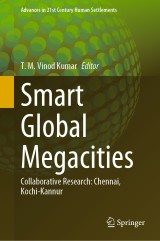Details

Smart Global Megacities
Collaborative Research: Chennai, Kochi-KannurAdvances in 21st Century Human Settlements
|
CHF 130.00 |
|
| Verlag: | Springer |
| Format: | |
| Veröffentl.: | 13.06.2021 |
| ISBN/EAN: | 9789811620232 |
| Sprache: | englisch |
Dieses eBook enthält ein Wasserzeichen.
Beschreibungen
<p>This book, the second volume, highlights 7 out of a total of about 36 megacities in the World which by definition have 10 million inhabitants. The cities/chapters presented in this book are based on recent advance such as the wide use of ICT, IOT, e-Governance, e-Democracy, smart economy and flattening and acceleration of the world that is taking place in recent times as reported by 3 times Pulitzer Prize Winner Thomas Friedman. It therefor departs from other ideologies where only a certain megacity qualifies for the title of smart global megacities while in reality every megacity can, and presents how smart global megacities can be created. </p>
The Configuration of Smart and Global Mega Cities.- E-Commerce and the City: Vignettes from Kozhikode, India.- TERRITORIAL INTELLIGENCE PROJECT: GOVERNANCE FOR MEGALOPOLIS URBAN-RURAL LINKAGE PATTERNC comparativestudy between Po River Valley Megalopolis Region, Italy & Chennai and Kolkata, India.- Smart Mega Global City:Sustainable Development Framework.- Spatial Configuration of Kochi-Kannur Megacity and emerging corridors.- Existing Situation of Proposed Smart Global Community in Kattangal.- Design of Smart Global Economic Community in Kattangal.- International Collaborative Research: “Smart Global Mega Cities” and Conclusions of Cities Case Studies: Chennai and Kochi-Kannur.
<p>Professor T. M. Vinod Kumar have 45 years of professional experience and had specialized in Urban and Regional Planning, Urban and Regional Infrastructure, Urban Environmental Management, Application of GIS in Urban Planning, Models in Planning , Urban Design and Smart Cities. He has vast consultancy experience all over India on Urban and Rural Development, Infrastructure, Tourism, Health Care and in Malaysia on New Town Planning and Development, City Centre and Housing Planning and Structure Plan. He has worked in Bhutan, China, Pakistan, Nepal and India for Energy for Mountain Development Program of International Centre for Integrated Mountain Development as Regional Program Coordinator. Academically he has worked in the School of Planning and Architecture, New Delhi as Professor, Head of Department Urban Planning, Head of Centre for Analysis and Systems Studies, Head Centre for Urban Studies and finally Dean of Studies of School of Planning and Architecture, New Delhi. He also worked as Planner-Engineer with the Ford Foundation, India. He was Visiting Professor at Bandung Institute of Technology Indonesia, and now in National Institute of Technology, Calicut. He is Author of many books and journal articles and Project Manager for many consulting projects in India and abroad.<b></b></p>
This book, the second volume, highlights 7 out of a total of about 36 megacities in the World which by definition have 10 million inhabitants. The cities/chapters presented in this book are based on recent advance such as the wide use of ICT, IOT, e-Governance, e-Democracy, smart economy and flattening and acceleration of the world that is taking place in recent times as reported by 3 times Pulitzer Prize Winner Thomas Friedman. It therefor departs from other ideologies where only a certain megacity qualifies for the title of smart global megacities while in reality every megacity can, and presents how smart global megacities can be created.
Highlights the state-of-the-art design of smart megacities, along with the associated challenges Uses several case studies to understand smart living and the role of citizens Shows how smart living helps in creating smart megacities
Diese Produkte könnten Sie auch interessieren:

Ermittlung der Wicklungstemperatur einer neunphasigen Synchronmaschine mit COMSOL

von: Yvonne Schröder

CHF 19.00

Amtliche Verkehrsüberwachung und ihre Abhängigkeit von der Mensch-Maschine-Interaktion

von: Sebastian Smykowski

CHF 146.00















